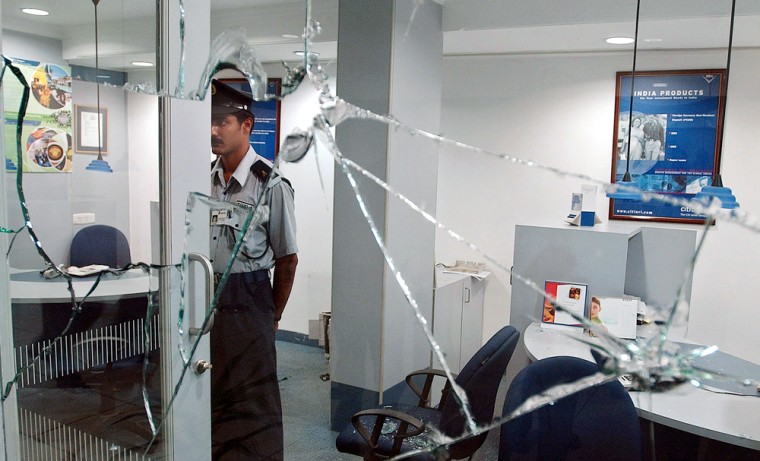What a difference a year makes: In June 2003, anarchists in Thessaloniki, Greece's second-largest city, smashed windows and set fire to a McDonald’s restaurant as part of a broad anti-capitalist protest. Fast-forward to this summer, with the 28th modern Olympic Games set in Athens, amid the high-profile corporate presence of many American companies — including McDonald’s.
In the contentious post-Sept. 11 global environment, and maybe more than ever before, American multinationals find they're selling the nation they represent as much as the products they create.
American corporations are on a world stage in Athens. But some companies have been the focus of anti-American sentiment and face the challenge of retaining their American identity in a volatile time while adapting to the customs and traditions of countries where they do business.
Especially since the start of the U.S.-led wars in Iraq and Afghanistan, there's been a veritable war on Madison Avenue icons, and other companies whose presence in some countries is seen as another kind of “boots on the ground.”
Love and hate
Recent events underscore the love-hate relationship some of the world has with U.S. corporations.
McDonald’s, a leading fast-food retailer with more than 30,000 restaurants, serves more than 45 million people daily in 100 countries. On Aug. 9 the company reported its 15th consecutive monthly worldwide same-store sales increase. Year-to-date global sales increased more than 8 percent.
Open season
But the golden arches have also been a frequent target of opportunity, with restaurants in Saudi Arabia, Lebanon, Germany, Indonesia and Norway firebombed or otherwise vandalized in the past 18 months. On May 20, the Associated Press reported that a bomb damaged cars at a parking lot for McDonald's in Istanbul, Turkey, and firefighters defused two explosives outside a McDonald’s in Rome.

Other American companies — from Citibank to Marriott, Newmont Mining to UPS, IBM to ChevronTexaco — have been targets of attacks overseas in recent months. And at least 42 employees of KBR, the engineering and construction arm of oil-services giant Halliburton, have been killed in Iraq and Kuwait.
In an atmosphere of enduring anti-American sentiment, how do the titans of American commerce position themselves in the global public eye? A survey of some companies and trade groups finds a variety of different strategies that seek to be responsive to difficult times.
Location, location, location
For Keith Reinhard, chief executive officer of the advertising agency DDB Worldwide, positioning company images is bread-and-butter work. DDB Worldwide is one of the world's largest agencies, with 206 offices in 96 countries. For him, the challenge of American brands’ surviving in the post-9/11 world varies by brand and by country.
“American cars are still preferred to German cars in certain Muslim states. Pepsi is preferred over Coke in certain countries for the reason that Pepsi is anti-Coke — a brand that is seen as almost interchangeable with the American flag," Reinhard said in an e-mail interview from Europe.
“Retailers in Bahrain have a list of all brands marketed by American companies, and those brands never reach their shelves,” he said.
Reaction is much the same elsewhere. “Earlier this year, 10 restaurants in Hamburg, Germany, banned Coke and Marlboro cigarettes and announced that customers could no longer pay with American Express cards,” Reinhard said.
Resentment a long time building
“Without question, resentment of our foreign policy has exacerbated the situation,” Reinhard said. “Global expansion by American business, while bringing many benefits to many people, also contributed to the problem.”
But it didn't begin when the wars did. “Iraq ignited a lot of latent negative feelings, but resentment of America has been building for at least the past two decades.”
A June survey conducted by the Harris Interactive consulting group, found that among respondents who lived in Britain, France, Germany, Italy and Spain, an average of only 7 percent viewed the U.S. government favorably — especially telling considering those countries’ historic friendship with the United States.
In July, the Washington Post reported that Arab views of the United States have worsened to the point that in Egypt — a crucial regional ally — nearly 100 percent of the population has an unfavorable view of America.
‘Root causes’
So what's to be done about America's image on the world stage beyond the Athens Games?
The challenge is one Reinhard hopes to answer with Business for Diplomatic Action (BDA), a nonprofit organization he founded this year, what he calls “a private-sector task force” whose mission “is to sensitize American companies and individuals to the rise of anti-Americanism in the world, and its implications.”
A BDA study found three “root causes” of anti-American sentiment”:
- Effects of globalization: “People in many countries feel left out; they feel that they can never be a part of, or enjoy the benefits of, the globalization movement led by U.S. business expansion.”
- The impact of American popular culture: The BDA paper found that some of America's entertainment “is often most attractive to young people in repressive cultures who are thus led to believe that America is a criminally violent and sexually immoral nation.”
- The perceived personality of Americans: “Research from 130 countries confirms that Americans are broadly perceived by others as arrogant, ignorant, lacking in humility, loud and unwilling to listen.”
Reinhard said research done in the 130 countries for its study would form the basis of a “world citizens guide, for young Americans who'll study abroad next semester.”
The passport-sized booklet — 200,000 copies will be published by the fall; 80,000 of them set for distribution to U.S. colleges for students going abroad — “will let traveling kids know they’re not in Kansas any more, and why Americans are not universally loved.”
Local talent, local flavor
For one trade executive, there's power in empowering the locals. “More and more, many companies work through intermediaries,” said Bill Stafford, president of the Seattle-based Trade Development Alliance. “A company in Seattle might have a distributor that's a Singapore company or a Taiwan company or a German company, so that people handling a product might be German or Taiwanese or whoever.

“When we do overseas trade missions now, I'm using a potpourri of people from different countries," Stafford said. "It's the way business is done more and more. It's not a strategy, it's a way of doing business.”
Stafford said Europeans seem to be of “a bifurcated, left-brain/right-brain thinking” about the American people and the American government. “Some Europeans wonder if the current administration was chosen by the American people.”
Stafford also suggested how the inroads of American culture globally can make strange bedfellows. He recalled how, on a trade trip to Munich, he was told “about a group of Germans sitting in a American pizza restaurant, having come from an American movie, drinking Cokes ... and complaining about America.”
Howard Schultz, the chairman of Starbucks Coffee, can probably relate. “We opened in Turkey, and everybody said, ‘You have to have Turkish coffee,’” Schultz said in an Aug. 23 interview with CNBC. “We opened in Greece, and they said we had to have something like that. When we open in all of these places, when customers come in, the first thing they ask for is a Starbucks Frappuccino.”
None of which has stopped a flurry of anti-Starbucks protests in recent years; the company has faced global boycotts and complaints from fair trade advocates seeking higher coffee prices for farmers in the countries where Starbucks coffee is grown.
Sturdy U.S. export: Reality TV
One project in the works with Reinhard's BDA nonprofit hopes to capitalize on another reliable American export — the continuing fascination with reality television.
Reinhard said BDA is developing a pilot for a reality program tentatively called “The Exchange,” a show being readied for a pitch to American networks, including MTV.
“Three students from a Muslim country would intern with a U.S. multinational in the U.S., while three U.S. students would intern with that same company overseas,” Reinhard said.
“Each trio would be the subject of three episodes — cameras following them through their work and living experiences. On the seventh episode, they would all come together and share their experiences.”
Putting away the ugly American
Other initiatives are under way — international outreach efforts, briefing programs for advertisers and U.S. executives, sharing best practices online, proposed corporate roundtables.
But Reinhard offered another way to improve America's global relationships. It's a strategy that depends less on the lofty plans of corporations and more on the behavior of the American vacationer — the need to have an open mind and to leave the ugly American at home.
“While our openness and gregariousness are often seen as positive qualities,” Reinhard said, “we’re also known to be arrogant, ignorant and loud. Perhaps the ultimate arrogance is the assumption Americans make that everyone wants to be exactly like [them]. They don't.”
“There are roughly 55 million Americans who have traveled or will travel abroad this year,” he said. “If we can tone down the volume and dial up the respect of even a small percent of U.S. travelers, we’ll have accomplished at least some positive adjustment to our personality.”
